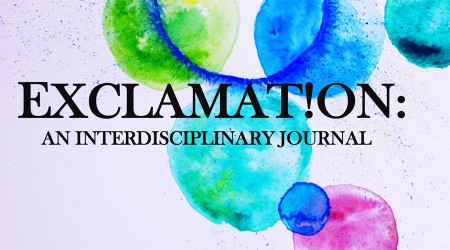2018 Researcher Led Initiatives
In 2018 we had 41 applications made to the Researcher-led initiative awards, with 20 being successfully funded. We would like to thank all of those who applied for an award and congratulations to our new award holders. Below is a series of examples of some of the funded awards in 2018.
Click here for this year's Researcher Led Initiative awards.
Award holder: Chloe Asker
Wellbeing Wednesday is a student led community that hosts activities, discussions and support around wellbeing and emotional/mental health in the Department of Geography. Examples of activities include: meditation, mindful colouring, and wellbeing walks. Sessions are informal, and operate on a drop-in basis. They last around an hour on a Wednesday afternoon. The group welcomes PGRs, post-docs, and staff members from all disciplines and often ends with an informal chat over tea and biscuits surrounding the activity we just participated in and any benefits that those attending felt.
The purpose of the sessions is to provide a supportive community based on wellbeing, generate conversations based on common problems faced by researchers (e.g. imposter syndrome, perfectionism, and anxiety), and to provide a break from work. It aims to promote an inclusive environment, with the core belief that everyone can benefit from looking after their emotional wellbeing.
Further information about Wellbeing Wednesdays can be found on their website.
Examples of work created at Wellbeing Wednesday:

Award holder: Coline Blaizeau and Sveta Yefimenko
Xanthos: A Journal of Foreign Literatures and Languages made quite a bit of progress in the first half of summer 2018. The month of May saw a substantial amount of applications from peer reviewers from all over the world who were eager to join our expanding team. After some deliberation, we brought aboard the most qualified postgraduate researchers with backgrounds in languages, literary theory, comparative literature, and linguistics.
Throughout May and June, responding to a call for submissions featured in print flyers distributed throughout Exeter, along with advertisements posted to Twitter and Facebook, contributors continued to submit their articles for the journal’s inaugural issue. The contributors whose articles were accepted for review have been working with peer reviewers and the journal’s editorial board throughout June and July to polish, refine, and perfect their writing and their arguments.
Meanwhile, our website engineer collaborated with the journal’s copyeditor and designer to create a blueprint for an engaging and professional site, the development of which will be completed in early August. It will feature Xanthos’ mission statement, the photographs and biographies of the editorial board members, a list of peer reviewers, a blog featuring online content which will be updated monthly, an events page describing past and upcoming activities hosted by Xanthos, links to the journal’s social media accounts, and, perhaps most importantly, a searchable archive of current and past issues. As the site nears completion, we are very excited to share Xanthos’ unique vision with the wider academic community. Please follow the site's development here: xanthosjournal.com.
The early summer months also included constant, active engagement with the journal’s social media accounts, with regular posts on Twitter and Facebook which consistently reach more than 150 followers.
Award holder: Skye Marshall
Shut up and Write! is a weekly meeting where attendees get on with some work, preferably writing, in three blocks of 25 minutes. There is a 5 minute and 15 minute break in between where people can chat about their work and offload any stresses they have! Tea, coffee and snacks were provided every week. The sessions were run weekly between April and September 2018 and will now continue for the foreseeable future. The sessions were based on the Shut Up and Write Tuesday initiative (SUWT-UK) started by Siobhan O’Dwyer, a lecturer at the Exeter Medical School.
A timer (http://tomatotimers.com/) was used to adhere to the 25 minute sessions. This worked really well to make sure everyone stopped talking while the timer was on. It also timed our breaks so the schedule was always kept to!
Shut Up and Write has grown since it was first funded via the RLIs, details of how it runs now can be found on our website.

Award holder: Teresa Sanders
Following the publication of Volume 1 of Exclamat!on: An Interdisciplinary Journal in June 2017, Wednesday 13th June 2018 saw the successful publication and launch of Volume 2, on the theme of ‘Identities’. Building on the work done in the first edition, the second welcomed submissions from postgraduate research and taught students from across the country. Submissions included poems and short stories, as well as Film and English articles on subjects ranging from magic realism and lesbian identity to an exploration of Charles Chaplin’s ‘Charlie’ identity, thereby demonstrating the breadth of response to the theme.
As editors, we started the journal just over a year ago with little, if any, experience between us in the field of publishing, nor any concrete idea as to how to actually facilitate - let alone run - a postgraduate journal! Although it was an exceptionally steep learning curve, over the course of that crucial first year, we gained invaluable experience that enabled us to put in place a number of measures which ensured the success of the second volume. We appointed a larger editorial team to deal with a greater number of submissions, and included the new role of Social Media Officer, to generate publicity and reach much wider and more diverse audiences throughout this year via our Twitter account (@ExclamationAIJ) and Facebook page (https://www.facebook.com/exclamationjournal/). We ran a ‘work in progress’ symposium at Exeter, seeking to provide postgraduates with the opportunity to present their work and ideas, as well as to receive feedback from their peers prior to submitting to the journal in January 2018. In addition to this, we ran a peer reviewing workshop. This was to allow PhD and Masters students to learn about the process of peer review, as well as enable us to maintain the high standard we had established with the first volume.
The second volume excitingly received numerous, high-calibre submissions from postgraduates across the UK. This presented a great deal of work for our editorial team, and incredibly difficult choices when it came to determining which submissions were going to make it into the journal, and what we were sadly going to have to reject. The team worked tirelessly with peer reviewers and authors, despite the challenges that term two presented within the Higher Education sector, to finesse submissions and shape them into the volume that was launched on Wednesday 13th June.
The launch took place after our inaugural conference on ‘Networks and Connections’: the theme of the next journal issue, due to be published in 2019. Forty delegates enjoyed a range of papers which encompassed linguistics, a short story, Shakespeare, and art as text, in creative and original responses to the stimulus. Presenters ranged across MA, MLitt and PhD students, from Exeter and further afield (the furthest delegate joined us from St Andrews!). A great atmosphere was generated from the very beginning, as people engaged with the panel speakers, as well as conversed and exchanged ideas during the breaks, thereby embodying the conference’s theme. We were also thrilled to have received an outstanding keynote address by Dr Andrea Macrae of Oxford Brookes University, who had made contact with the journal shortly after the first edition appeared, to initiate a conversation about student journals. This forged the first link in the journal’s growing and national network of connections.
The conference and launch combined was hugely successful, and garnered overwhelmingly positive feedback. A number of delegates, via feedback sheets and the Twitter handle ‘#Exnetcon’, commented on the ‘really high calibre papers’ and ‘rich diversity’; on the ‘very well-organised and very friendly atmosphere’. Other comments included: ‘I loved the threads/networks between the panels’, and that it was ‘a brilliantly organised day’. The conference proceedings were finally rounded off by a wine reception, at which Professor Regenia Gagnier officially launched the second volume of Exclamat!on. In a speech that brilliantly summed up the day, Regenia commented on the high standard, professionalism, and rigour of the journal, and congratulated the editorial team on their commitment and dedication to postgraduate endeavour and scholarship. This is something that we will aim to maintain as we proceed in the new academic year to produce Volume 3 of Exclamat!on on ‘Networks and Connections’.
Further details about Exclamat!on can be found on their website.

